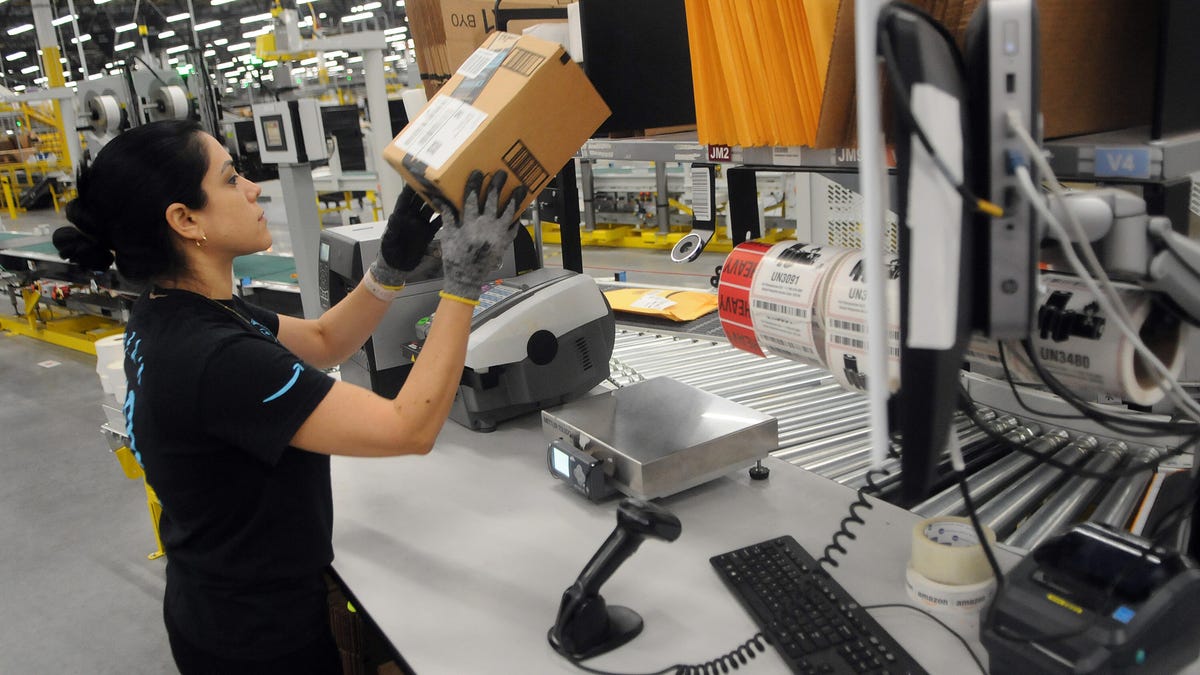 Why You Can Trust CNET
Why You Can Trust CNET Amazon struggles to respond to surge in orders as coronavirus crisis deepens
To meet surging demand, the company makes big changes to its operations.

A worker at an Amazon warehouse in Orlando, Florida, in April 2019.
Amazon is used to huge spikes in demand: It ships millions of packages after Prime Day and during the holiday season. But the spread of the coronavirus, which has locked down cities and put everyone in a more isolated reality, has tested the company's ability to meet its customers' needs like never before.
The stakes for the world's biggest online retailer couldn't be higher, with its huge logistics operations and hundreds of thousands of employees now turning into a critical resource for millions of shoppers amid store closures and social distancing. Amazon, which accounts for roughly 39% of US e-commerce sales and is already a dominant player in retail, will now become a central provider of food, medical supplies and household goods for many customers, potentially for months, as they avoid leaving their homes.
If Amazon succeeds in fulfilling more customer orders during the crisis, it may emerge as an even more dominant force than it was before.
But the start of the coronavirus outbreak hasn't been easy for the company, with toilet paper and medical supplies going out of stock, deliveries slowing down, Amazon Fresh grocery shipment windows becoming scarce, and Amazon needing to fight off price gouging and counterfeits for much-needed products like hand sanitizer and masks. Earlier this month, the company's delivery system for Prime Now, Amazon Fresh and Whole Foods services suffered a significant glitch that forced some customer orders to be delayed or canceled.
Warehouse workers and their supporters have also started raising concerns about working conditions in fulfillment centers, with fears that an outbreak in a warehouse could sicken many employees and potentially weaken operations. Last week, the company disclosed its first coronavirus case in a US warehouse and temporarily shut down the Queens, New York, delivery center where the employee was located.
Amazon's leaders are trying to show they're up to the monumental task, and the company moved quickly this past week to make big changes to react to the surge in demand.
Looking to allay customers' concerns that their items won't be delivered, the company last Monday announced plans to hire 100,000 more part-time and full-time US hourly employees to staff warehouses and run delivery routes. It followed that announcement with plans last Tuesday to prioritize shipments into its warehouses of medical supplies and household staples and prevent all other new shipments from coming in. Over the weekend, Amazon said it's raising overtime pay, as well.
Walmart, the largest retailer in the US, has also announced plans to ramp up hiring and boosted workers' pay during the crisis
"We're providing a vital service to people everywhere, especially to those, like the elderly, who are most vulnerable. People are depending on us," Amazon founder and CEO Jeff Bezos wrote on Amazon's company blog over the weekend.
Regarding worker health in warehouses, the company said it's consulting with medical and health professionals and adding preventative measures like increased cleaning to ensure workers are safe.
Victor Rosenman, CEO of Feedvisor, a software provider for independent Amazon merchants, said he believes the worst of the supply chain bottleneck is happening right now, as major manufacturers in China are just starting to come back online following that country's coronavirus lockdowns, and US and European customers have flooded digital and physical stores for pantry items.
"It will slowly come back to normal, I don't think it's a permanent issue," said Rosenman, who is based in New York. "And eventually people will relax, because right now people are starting to panic."
Coronavirus updates
James Thomson, a former Amazon executive who's now a consultant for brands and manufacturers selling on Amazon, said Amazon's latest moves to increase staffing and focus its incoming supplies will help put it in the best position to meet the higher demand.
He added that Amazon doesn't do this work alone, likely leaning much more heavily on its partners UPS and the US Postal Service to make deliveries. Added to that, delays will be inevitable, he said, since -- unlike during the holidays -- Amazon was forced to come up with this strategy with hardly any warning.
Amazon warehouse workers in Fall River, Massachusetts, in 2018.
"Amazon executives are smart and they move quickly but there's a physical limit to, 'How do I get my hands on 500 more 18-wheelers?'" said Thomson, who works for Buy Box Experts in Seattle.
"The fact that they've done this tells me it's not a 40% or 50% increase, but a two or three [times] increase," he said about Amazon's decision to restrict deliveries into its warehouses. "The system is bursting at the seams."
The e-commerce giant will benefit from lowered expectations from customers during the emergency situation, Rosenman added. People want to know their stuff will arrive in the next few days -- same-day deliveries are no longer necessary. He said so far Amazon is fulfilling that new promise.
"If I were in Amazon's shoes, I would not push myself to be in the same standard as normal times, but one step faster than the competition," Rosenman said.
Perhaps taking up this advice, Amazon on Monday said it was delaying US shipments of non-essential items by up to a month.

